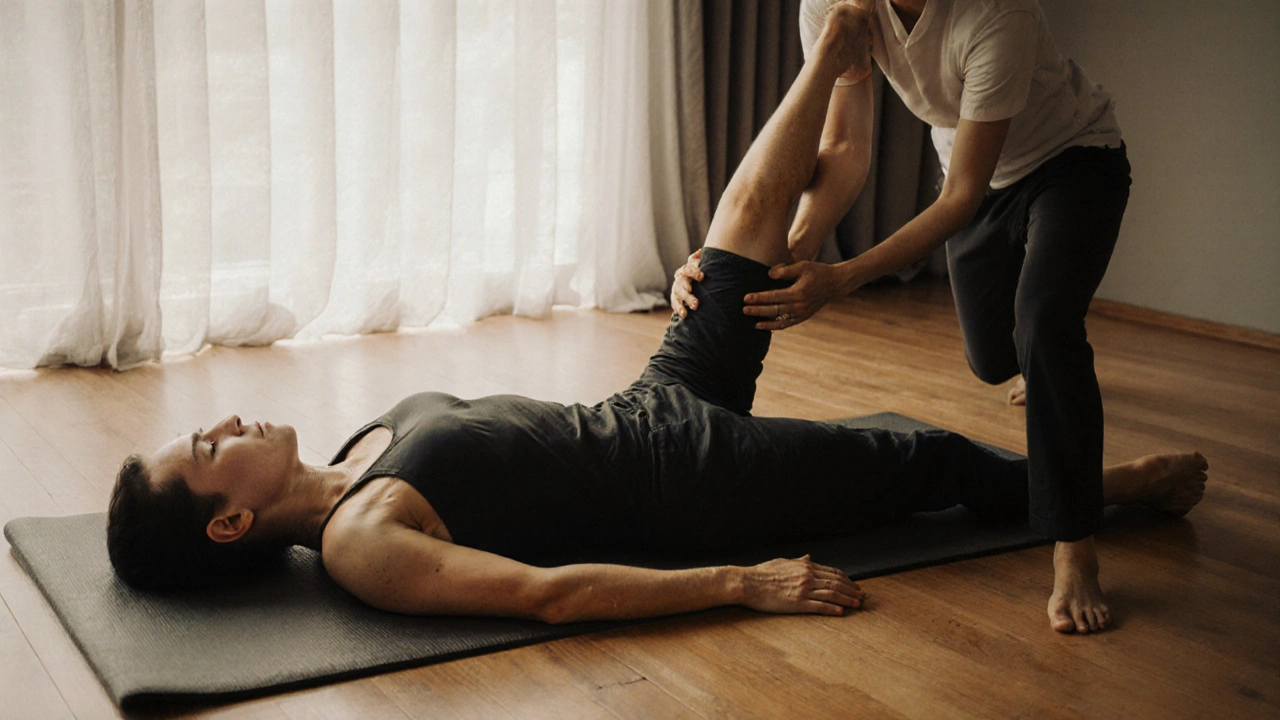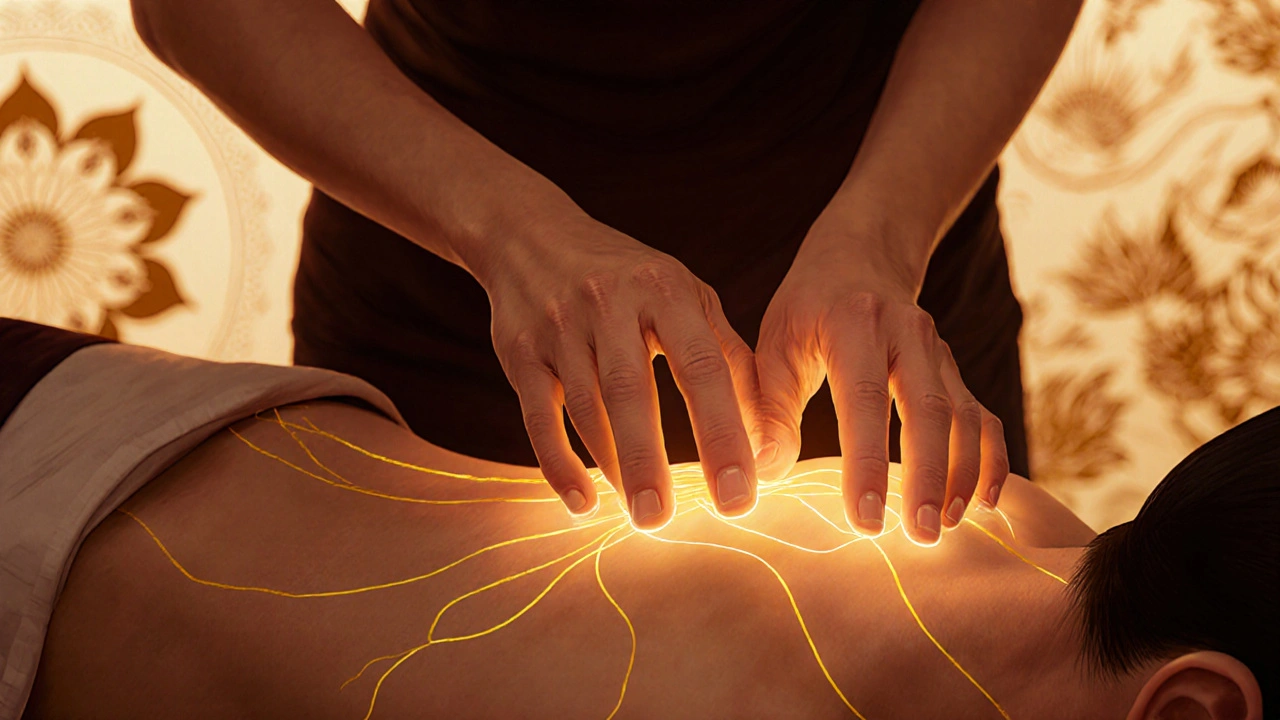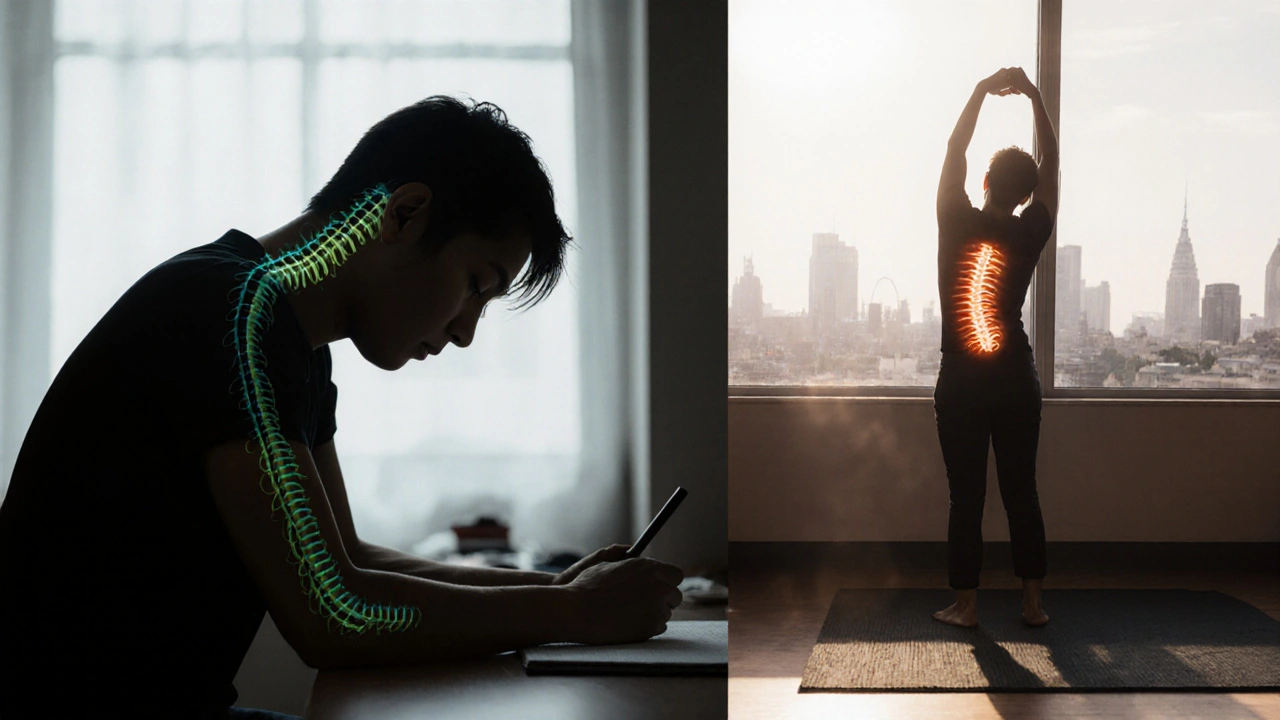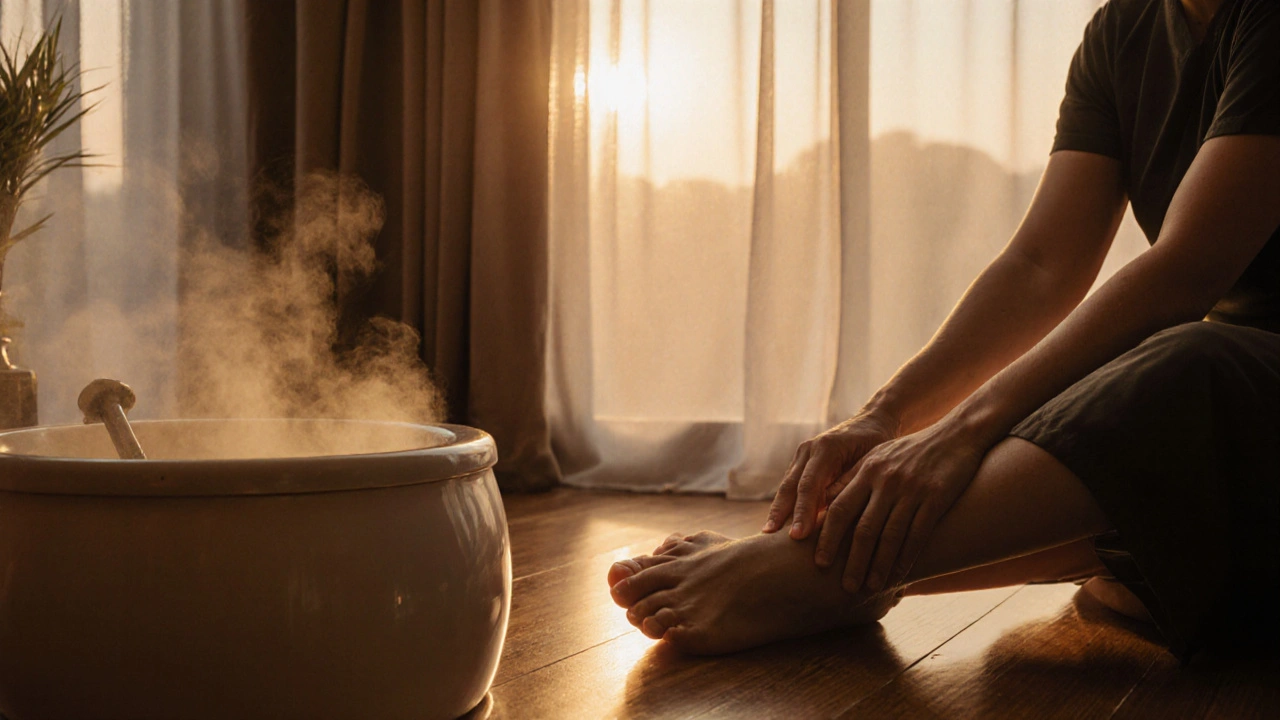Discover how reflexology enhances body massage by targeting nerve zones linked to organs and systems, reducing stress, and improving relaxation. Learn how it works, who benefits most, and where to find it in London.

- Created by: Elara Wainwright
- Completed on: 27 Oct 2025
- Categories: Thai Massage
Ever feel like your body is holding onto stress you didn’t even know you had? Like your shoulders are permanently glued to your ears, your lower back screams after sitting at a desk for eight hours, and no amount of coffee or scrolling helps? You’re not broken. You’re just overdue for a Thai massage.
What Exactly Is Thai Massage?
Thai massage isn’t just another spa treatment. It’s a 2,500-year-old healing practice that blends acupressure, assisted yoga postures, and deep stretching. Unlike Swedish or deep tissue massage, you stay fully clothed-usually in loose, comfortable clothes-and lie on a mat on the floor. The therapist uses their hands, thumbs, elbows, knees, and even feet to apply pressure along energy lines called sen lines and guide your body through a series of stretches.
Think of it as yoga, but someone else is doing the heavy lifting. You relax. They move you. No effort required. It’s not about kneading muscles-it’s about releasing tension from the inside out. The rhythm is slow, intentional, and deeply rhythmic, almost like a dance between you and the therapist.
Why It Works Better Than You Think
Here’s the truth: most massages focus on muscles. Thai massage works on the whole system.
- Improves flexibility - After just one session, many people notice they can reach further, bend easier, or twist without a wince. One 2021 study in the Journal of Physical Therapy Science found participants improved hip flexibility by 23% after five Thai massage sessions.
- Reduces chronic pain - Whether it’s lower back pain from sitting too long or tension headaches from staring at screens, Thai massage helps. The pressure on key points interrupts pain signals and boosts circulation, bringing oxygen and healing fluids to tight areas.
- Calms the nervous system - The rhythmic pressure and slow stretches trigger your parasympathetic nervous system. That’s the part that says, “You’re safe. You can relax now.” Heart rate drops. Breathing slows. Cortisol (the stress hormone) decreases.
- Boosts energy - Sounds weird, right? You’d think being stretched and pressed would leave you drained. But because it clears blocked energy flow, most people feel lighter, clearer-headed, and oddly energized afterward.
One client in London told me she started going weekly after her car accident. “I couldn’t turn my head without pain. After three sessions, I could look over my shoulder while driving. I cried the first time I did it. Not from pain-from relief.”
What Happens During a Session?
You walk in. You’re offered loose cotton pants and a top if you don’t have your own. You lie on a padded mat on the floor. No oil. No music (unless you ask). Just quiet, focused attention.
The therapist starts at your feet. They press along the soles, then move up your calves, thighs, and hips. You’ll feel deep, steady pressure-not painful, but firm. Then comes the stretching: your leg lifted gently into a hamstring stretch, your spine twisted slowly, your arms pulled overhead. It feels like someone is carefully untangling knots you didn’t know were there.
You might hear a quiet “ahhh” escape your lips. That’s normal. Some people fall asleep. Others laugh. A few cry. It’s not about being “good” at relaxing. It’s about letting go.
Most sessions last 60 to 90 minutes. You won’t feel sore afterward. You’ll feel… reset.

Where to Find Authentic Thai Massage in London
London has dozens of places offering Thai massage-but not all are created equal. Look for these signs:
- Therapists trained in Thailand - The best places hire therapists who trained in Bangkok or Chiang Mai. Ask where they studied. Reputable studios are proud to say.
- Mat on the floor - If you’re on a massage table with oil, it’s not traditional Thai massage. It might be a hybrid, but it’s not the real thing.
- Minimal noise - Authentic Thai massage is quiet. No loud spa music. No chattering. Just breath and movement.
Popular spots in London include Thai Massage London in Soho, Wat Pho Thai Massage in Camden, and Chiang Mai Spa in Brixton. All have therapists who trained in Thailand and offer 60- or 90-minute sessions.
How Much Does It Cost?
Prices in London vary, but here’s the real deal:
- 60 minutes - £55 to £75
- 90 minutes - £75 to £100
- 120 minutes - £100 to £130
Anything under £50 for 60 minutes? Be careful. You’re paying for skill, not just time. A good Thai massage therapist has trained for years. Don’t cheap out on your body.
Many places offer first-time discounts or package deals (e.g., 5 sessions for the price of 4). Book online. Most studios let you book via their website or WhatsApp.

Thai Massage vs. Swedish Massage: What’s the Difference?
| Feature | Thai Massage | Swedish Massage |
|---|---|---|
| Setting | Mat on floor | Massage table |
| Clothing | Fully clothed | Naked under towel |
| Technique | Pressure + stretching + acupressure | Long strokes, kneading, light friction |
| Oils | None | Yes |
| Focus | Energy flow, flexibility, joint mobility | Relaxation, muscle tension release |
| After feeling | Light, energized, flexible | Relaxed, sleepy, calm |
Swedish is great if you want to melt into a pillow. Thai massage is better if you want to feel like you’ve been rebooted.
Who Should Avoid It?
Thai massage is safe for most people-but not everyone.
- Avoid if you have: Recent fractures, severe osteoporosis, open wounds, or active blood clots.
- Be cautious if you’re: Pregnant (especially first trimester), have high blood pressure, or have a history of stroke.
- Always tell your therapist: If you’re injured, have chronic pain, or feel uncomfortable during a stretch. Good therapists will adjust on the spot.
If you’re unsure, talk to your doctor. But for most people, the risks are minimal-and the rewards are huge.
What to Do After Your Session
Don’t rush off. Drink water. Your body is flushing out toxins released during the massage. Avoid caffeine or heavy meals for the next hour.
Take a quiet walk. Notice how your body moves differently. Maybe you can touch your toes now. Maybe your neck doesn’t ache when you look up. That’s the magic.
Try to schedule your next session before you leave. Don’t wait until you’re stiff again. Thai massage works best as a regular habit-not a one-time fix.
Is Thai massage painful?
It shouldn’t be. The pressure is firm, but it should never make you wince or gasp in pain. Think of it as “good hurt”-like a deep stretch after a long workout. If it hurts too much, speak up. A good therapist will adjust immediately.
Do I need to be flexible to try Thai massage?
No. That’s the whole point. Thai massage is for people who aren’t flexible. The therapist moves you gently into stretches your body can handle. Over time, you’ll become more flexible-without ever doing a yoga class.
Can I get Thai massage if I’m not into “spiritual” stuff?
Absolutely. While Thai massage has roots in Buddhist healing traditions, modern sessions in London are completely secular. You don’t need to believe in energy lines to benefit. It’s physical therapy disguised as a massage.
How often should I get Thai massage?
Once a month is great for maintenance. If you sit all day, have chronic pain, or train hard, once a week helps. Think of it like brushing your teeth-regular care prevents bigger problems.
Will I feel sore afterward?
Not usually. Some people feel a little tender in areas that were tight, but it’s not the muscle soreness you get after a workout. More like a deep, pleasant release. If you’re sore for more than a day, you may have had too much pressure. Tell your therapist next time.
You’ve spent years ignoring your body’s whispers. It’s time to listen. A Thai massage isn’t a luxury-it’s a reset button for your nervous system, your joints, and your sanity. You don’t need to be stressed out to benefit. You just need to be ready to feel better.
Book your session today. Your future self will thank you.
Struggling with chronic pain can really drain your energy, but deep tissue massage offers real, hands-on relief without relying on medication. This article explains how deep tissue massage works, what makes it different, and why more people are turning to it for pain management. We’ll break down what happens during a session, what benefits you can expect, and key safety tips. Want to know if it’s right for you? Everything you need to make an informed choice is covered here.
Explore what goes on in the world of massage therapy—benefits, session experiences, safety tips, price info, and practical, real-life advice.




Kathy Irion
October 29, 2025 AT 09:26I’ve been getting Thai massages for two years now, and honestly? It’s the only thing that’s kept me from quitting my job and moving to a beach in Thailand. My lower back used to scream at 3 p.m. every day. Now? I can bend over to tie my shoes without groaning. It’s not magic-it’s science, and also, my body finally feels like it belongs to me again.
Also, I cried during my first session. Not because it hurt. Because I realized I hadn’t taken a full breath in years. Weird, right? But true.
Marie Elizabeth
October 30, 2025 AT 15:46Just wanted to say thank you for this detailed post-it’s the most thoughtful, accurate summary of Thai massage I’ve ever read. No fluff, no hype, just clear facts and real experience. I’ve shared it with three friends who’ve been skeptical, and two of them booked sessions this week. You’ve done good work here.
Danny van Adrichem
November 1, 2025 AT 07:37Let me guess-you’re one of those people who thinks ‘energy lines’ are real? Look, I get it. You want to believe in ancient wisdom. But let’s be real: Thai massage is just deep tissue with extra stretching and a side of cultural appropriation wrapped in incense smoke. The ‘sen lines’? Totally made up. No peer-reviewed study proves they exist. It’s all placebo with a side of yoga pants.
And don’t even get me started on the ‘authentic’ studios in London. Most of those therapists trained in a 3-week online course in Bangkok and then flew over to charge £80/hour. I’ve seen the receipts. They’re not healers-they’re hustlers. And the ‘no music’ thing? That’s just because they can’t afford a Spotify Premium account.
Swedish massage is cheaper, less weird, and actually backed by actual anatomy. Why waste your time and money on mystical nonsense? Just get a foam roller and a good podcast.
Nishad Ravikant
November 2, 2025 AT 19:31My cousin in Bangkok learned Thai massage from her grandmother, who studied under a monk at Wat Pho. She says the real secret isn’t the pressure-it’s the intention. Every touch is meant to carry calm. I tried it once after a bad breakup and didn’t cry. But I slept for 11 hours straight. That’s the real reset.
Also, the £55 price in London? That’s a steal. In Chiang Mai, you get 90 minutes for $12 USD and a free mango sticky rice afterward. If you’re going to spend that much, go all in-book the 120-minute session and bring a friend. Share the peace.
S.l F
November 3, 2025 AT 16:07Thank you for this exceptionally well-researched and compassionate piece. As someone who has spent over a decade in the wellness industry, I can confidently say that Thai massage remains one of the most underappreciated modalities in modern urban life. The integration of physical therapy, breath awareness, and mindful movement is not merely therapeutic-it is transformative.
I have personally recommended this practice to clients suffering from chronic stress, postural dysfunction, and even mild depression. The results, consistently, are profound. The emphasis on being fully clothed and the absence of oils allow for a deeper, more grounded experience-one that honors the body’s natural rhythm rather than overwhelming it.
For those concerned about cost, I would encourage you to view this not as an expense, but as an investment in long-term mobility, mental clarity, and emotional resilience. The body does not lie. If you are feeling stiff, tired, or emotionally drained, it is not a sign of weakness-it is a signal. And Thai massage is one of the most elegant responses to that signal.
May you all find the space to breathe, stretch, and truly rest.